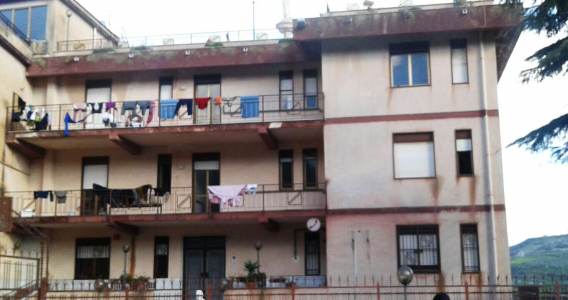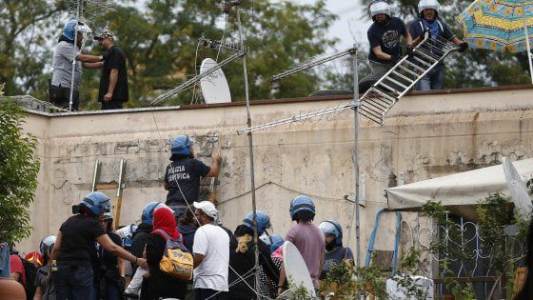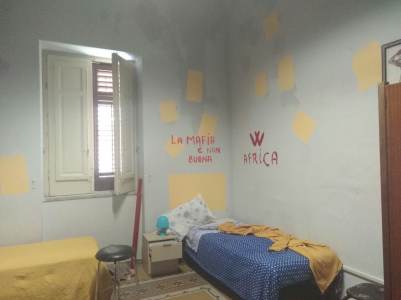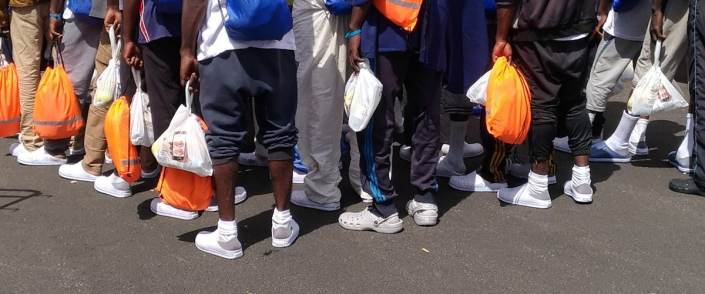From Tripoli to Ciminna: The Women in an Emergency Reception Centre in the Province of Palermo
A Report from the Sportello Sans Papiers – ARCI Porco Rosso
Two weeks ago we visited the residents of the Extraordinary Reception Center* in Ciminna. The centre opened a few months ago, located behind a cemetery on the outskirts of a small town in the province of Palermo. Years ago the building used to house the “Boccone del Povero”, an old age home not far from the monastery of the Capuchin friars. About eight months ago, two social cooperatives – ‘Onlus Facilty Service’ and ‘Metamorphoses’ – came together to bid for the contract tendered by the Prefecture of Palermo for the opening of a new Extraordinary Reception Center.
According to our own estimates, there are 44 such centres in the province and city of Palermo, of which seven are allocated specifically for women and nuclear families. The bid commission closed the tender at the end of May last year and the proposed winners were approved on June 13, 2017. The project needed to be reviewed in lack of administrative verfications, and in the end the Ciminna cooperatives (as well as another cooperative in the bid) made it to the final round on July 10 “with conditions” “regarding verifications yet to be completed.” Furthermore, according to an interview with the project manager published on the blog “I nuovi vespri”, by June last year around 20 male residents had already been placed in the center, only to have left it a few days later. This would be the first in a long series of episodes of people abandoning the centre.
Indeed, we had every reason to go to Ciminna. One month before our visit some young women, who had been transferred there a few weeks beforehand, came to our drop-in center because they urgently needed a place to sleep, as they had missed the last bus to Ciminna that evening. It was not the first, nor the last time that young women would leave the center as a result of its isolation and lack of services, as we have unfortunately been able to witness.
The centre in Ciminna hosts women and nuclear families; there are about 24 people of different nationalities: Ivoirians, Eritreans, Somalis, Cameroonians, Guineans, Ghanaians, Tunisians, Moroccans and Nigerians. One resident who is nine months pregnant says that she has never seen a doctor. One group of women arrived in October and another larger group at the beginning of April, following the Sea Watch landing in Messina on January 20th. Most of the people stayed at Messina Hotspot for a few days prior to being transferred to the centre.
Two families have been there for the longest, one for eight months and another for six. It is clear that most of the residents who have been brought to the centre since it opened have left on their own accord. Yet while they may have done so voluntarily, considering the isolation of the centre and the living conditions reported by almost all of the residents, they had little alternative.
 When we arrived the residents asked us if we were with the UN, from whom they had received a visit a few months ago. We entered the building but remained in the lobby to speak with the residents. One woman said, “I was in Libya for almost two years, and only God knows the things I’ve seen…but I would never have expected to find myself in this place once I arrived to Europe. There’s nothing here, simply nothing.” She has a notebook in her hands, so we ask if she is going to school. She says she has never seen a teacher, nor a volunteer for the Italian course. She asks us to help her and begins to cry, turning away to hide her face.
When we arrived the residents asked us if we were with the UN, from whom they had received a visit a few months ago. We entered the building but remained in the lobby to speak with the residents. One woman said, “I was in Libya for almost two years, and only God knows the things I’ve seen…but I would never have expected to find myself in this place once I arrived to Europe. There’s nothing here, simply nothing.” She has a notebook in her hands, so we ask if she is going to school. She says she has never seen a teacher, nor a volunteer for the Italian course. She asks us to help her and begins to cry, turning away to hide her face.
At the time of our visit there was only one non-resident there, a woman who introduced herself as a volunteer. The manager and staff were entirely absent. The residents said that during the week there are usually three members of staff who alternate shifts, as well as an Arab-speaking mediator.
Of those who spoke with us, aside from one woman who has been there for a longer time, everyone said that they had never seen a doctor. One young woman complained of having had an infection accompanied by severe pain since October and asked us for assistance, as her requests have gone unheard for four months. No one had seen a doctor or received any legal orientation and none had ever gone to the immigration department of the police station. Many are still wearing the clothing and flipflops from the boat landing and said they had not received anything else to wear. They say they eat once a day and that the water they use is taken from a fountain nearby. Indeed the local news reported that in August the police had verified the lack of running water in the building.
Considering all that we have seen and heard, we want to reflect on the severity of a situation like the one we have just described. This situation is of course not new – indeed there are many isolated and dilapidated centre, former luxury hotels, the result of 1970s building speculation, abandoned ski resorts and chalets, now destined for quite a different kind of business. Nevetheless, we have never seen women and children forced to deal with these conditions: women in a late state of pregnancy, young women with sexually transmitted diseases, people who have only recently escaped from detention centers run by Libyan militias – and at a high price, in human terms as well as monetary ones. People who are vulnerable and are in need of a responsive reception system with professional staff, people who need psychological support – especially those who have experienced violent trauma, as many of them have. But we are very far away from such a system, as much as it might be discussed. Instead, people run away from the system as it is, as it has been built and designed, preferring instead to reside on the margins of our cities.
Sportello Sans-Papiers –Arci Porco Rosso
*Extroardinary Reception Centre = CAS (Centro di accoglienza straordinaria)
Project “OpenEurope” – Oxfam Italia, Diaconia Valdese, Borderline Sicilia Onlus
Translation: Leanne Tory-Murphy and Richard Braude





